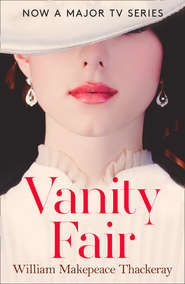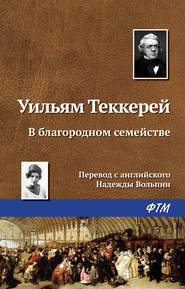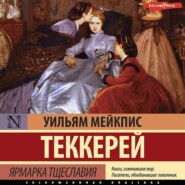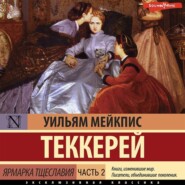По всем вопросам обращайтесь на: info@litportal.ru
(©) 2003-2024.
✖
A History of Pendennis. Volume 1. His fortunes and misfortunes, his friends and his greatest enemy
Настройки чтения
Размер шрифта
Высота строк
Поля
"What a couple of fools they are," thought the old guardian. "If I hadn't come down, she would have driven over in state to pay a visit and give her blessing to the young lady's family."
"Come, come," said he still grinning at the couple, "let us have as little sentiment as possible, and Pen, my good fellow, tell us the whole story."
Pen got back at once to his tragic and heroical air. "The story is, sir," said he, "as I have written it to you before. I have made the acquaintance of a most beautiful and most virtuous lady; of a high family, although in reduced circumstances: I have found the woman in whom I know that the happiness of my life is centered; I feel that I never, never can think about any woman but her. I am aware of the difference of our ages and other difficulties in my way. But my affection was so great that I felt I could surmount all these; – that we both could: and she has consented to unite her lot with mine, and to accept my heart and my fortune."
"How much is that, my boy?" said the major. "Has any body left you some money? I don't know that you are worth a shilling in the world."
"You know what I have is his," cried out Mrs. Pendennis.
"Good heavens, madam, hold your tongue!" was what the guardian was disposed to say; but he kept his temper, not without a struggle. "No doubt, no doubt," he said. "You would sacrifice any thing for him. Every body knows that. But it is, after all, then, your fortune which Pen is offering to the young lady; and of which he wishes to take possession at eighteen."
"I know my mother will give me any thing," Pen said, looking rather disturbed.
"Yes, my good fellow, but there is reason in all things. If your mother keeps the house, it is but fair that she should select her company. When you give her house over her head, and transfer her banker's account to yourself for the benefit of Miss What-d'-you-call-'em – Miss Costigan – don't you think you should at least have consulted my sister as one of the principal parties in the transaction? I am speaking to you, you see, without the least anger or assumption of authority, such as the law and your father's will give me over you for three years to come – but as one man of the world to another, – and I ask you, if you think that, because you can do what you like with your mother, therefore you have a right to do so! As you are her dependent, would it not have been more generous to wait before you took this step, and at least to have paid her the courtesy to ask her leave?"
Pen held down his head, and began dimly to perceive that the action on which he had prided himself as a most romantic, generous instance of disinterested affection, was perhaps a very selfish and headstrong piece of folly.
"I did it in a moment of passion," said Pen, floundering; "I was not aware what I was going to say or to do" (and in this he spoke with perfect sincerity). "But now it is said, and I stand to it. No; I neither can nor will recall it. I'll die rather than do so. And I – I don't want to burthen my mother," he continued. "I'll work for myself. I'll go on the stage and act with her. She – she says I should do well there."
"But will she take you on those terms?" the major interposed. "Mind, I do not say that Miss Costigan is not the most disinterested of women: but, don't you suppose, now, fairly, that your position as a young gentleman of ancient birth and decent expectations, forms a part of the cause why she finds your addresses welcome?"
"I'll die, I say, rather than forfeit my pledge to her," said Pen, doubling his fists and turning red.
"Who asks you, my dear friend?" answered the imperturbable guardian. "No gentleman breaks his word, of course, when it has been given freely. But after all, you can wait. You owe something to your mother, something to your family – something to me as your father's representative."
"Oh, of course," Pen said, feeling rather relieved.
"Well, as you have pledged your word to her, give us another, will you, Arthur?"
"What is it?" Arthur asked.
"That you will make no private marriage – that you won't be taking a trip to Scotland, you understand."
"That would be a falsehood. Pen never told his mother a falsehood," Helen said.
Pen hung down his head again, and his eyes filled with tears of shame. Had not this whole intrigue been a falsehood to that tender and confiding creature who was ready to give up all for his sake? He gave his uncle his hand.
"No, sir – on my word of honor, as a gentleman," he said, "I will never marry without my mother's consent!" and giving Helen a bright parting look of confidence and affection unchangeable, the boy went out of the drawing-room into his own study.
"He's an angel – he's an angel," the mother cried out, in one of her usual raptures.
"He comes of a good stock, ma'am," said her brother-in-law – "of a good stock on both sides." The major was greatly pleased with the result of his diplomacy – so much so, that he once more saluted the tips of Mrs. Pendennis's glove, and dropping the curt, manly, and straightforward tone in which he had conducted the conversation with the lad, assumed a certain drawl which he always adopted when he was most conceited and fine.
"My dear creature," said he, in that his politest tone, "I think it certainly as well that I came down, and I flatter myself that last botte was a successful one. I tell you how I came to think of it. Three years ago my kind friend Lady Ferrybridge sent for me in the greatest state of alarm about her son Gretna, whose affair you remember, and implored me to use my influence with the young gentleman, who was engaged in an affaire de c[oe]ur with a Scotch clergyman's daughter, Miss MacToddy. I implored, I entreated gentle measures. But Lord Ferrybridge was furious, and tried the high hand. Gretna was sulky and silent, and his parents thought they had conquered. But what was the fact, my dear creature? The young people had been married for three months before Lord Ferrybridge knew any thing about it. And that was why I extracted the promise from Master Pen."
"Arthur would never have done so," Mrs. Pendennis said.
"He hasn't – that is one comfort," answered the brother-in-law.
Like a wary and patient man of the world, Major Pendennis did not press poor Pen any farther for the moment, but hoped the best from time, and that the young fellow's eyes would be opened before long to see the absurdity of which he was guilty. And having found out how keen the boy's point of honor was, he worked kindly upon that kindly feeling with great skill, discoursing him over their wine after dinner, and pointing out to Pen the necessity of a perfect uprightness and openness in all his dealings, and entreating that his communications with his interesting young friend (as the major politely called Miss Fotheringay) should be carried on with the knowledge, if not approbation, of Mrs. Pendennis. "After all, Pen," the major said, with a convenient frankness that did not displease the boy, while it advanced the interests of the negotiator, "you must bear in mind that you are throwing yourself away. Your mother might submit to your marriage, as she would to any thing else you desired, if you did but cry long enough for it: but be sure of this, that it can never please her. You take a young woman off the boards of a country theater and prefer her, for such is the case, to one of the finest ladies in England. And your mother will submit to your choice, but you can't suppose that she will be happy under it. I have often fancied, entre nous, that my sister had it in her eye to make a marriage between you and that little ward of hers – Flora, Laura – what's her name? And I always determined to do my small endeavor to prevent any such match. The child has but two thousand pounds, I am given to understand. It is only with the utmost economy and care that my sister can provide for the decent maintenance of her house, and for your appearance and education as a gentleman; and I don't care to own to you that I had other and much higher views for you. With your name and birth, sir – with your talents, which I suppose are respectable, with the friends whom I have the honor to possess, I could have placed you in an excellent position – a remarkable position for a young man of such exceeding small means, and had hoped to see you, at least, try to restore the honors of our name. Your mother's softness stopped one prospect, or you might have been a general, like our gallant ancestor who fought at Ramillies and Malplaquet. I had another plan in view: my excellent and kind friend, Lord Bagwig, who is very well disposed toward me, would, I have little doubt, have attached you to his mission at Pumpernickel, and you might have advanced in the diplomatic service. But, pardon me for recurring to the subject; how is a man to serve a young gentleman of eighteen, who proposes to marry a lady of thirty, whom he has selected from a booth in a fair? – well, not a fair – a barn. That profession at once is closed to you. The public service is closed to you. Society is closed to you. You see, my good friend, to what you bring yourself. You may get on at the bar, to be sure, where I am given to understand that gentlemen of merit occasionally marry out of their kitchens; but in no other profession. Or you may come and live down here – down here, mon Dieu! forever" (said the major, with a dreary shrug, as he thought with inexpressible fondness of Pall Mall), "where your mother will receive the Mrs. Arthur that is to be, with perfect kindness; where the good people of the county won't visit you; and where, by Gad, sir, I shall be shy of visiting you myself, for I'm a plain-spoken man, and I own to you that I like to live with gentlemen for my companions; where you will have to live, with rum-and-water-drinking gentlemen-farmers, and drag through your life the young husband of an old woman, who, if she doesn't quarrel with your mother, will at least cost that lady her position in society, and drag her down into that dubious caste into which you must inevitably fall. It is no affair of mine, my good sir. I am not angry. Your downfall will not hurt me farther than that it will extinguish the hopes I had of seeing my family once more taking its place in the world. It is only your mother and yourself that will be ruined. And I pity you both from my soul. Pass the claret: it is some I sent to your poor father; I remember I bought it at poor Lord Levant's sale. But of course," added the major, smacking the wine, "having engaged yourself, you will do what becomes you as a man of honor, however fatal your promise may be. However, promise us on our side, my boy, what I set out by entreating you to grant – that there shall be nothing clandestine, that you will pursue your studies, that you will only visit your interesting friend at proper intervals. Do you write to her much?"
Pen blushed and said, "Why, yes, he had written."
"I suppose verses, eh! as well as prose? I was a dab at verses myself. I recollect when I first joined, I used to write verses for the fellows in the regiment; and did some pretty things in that way. I was talking to my old friend General Hobbler about some lines I dashed off for him in the year 1806, when we were at the Cape, and, Gad, he remembered every line of them still; for he'd used 'em so often, the old rogue, and had actually tried 'em on Mrs. Hobbler, sir – who brought him sixty thousand pounds. I suppose you've tried verses, eh, Pen?"
Pen blushed again, and said, "Why, yes, he had written verses."
"And does the fair one respond in poetry or prose?" asked the major, eying his nephew with the queerest expression, as much as to say, "O Moses and green spectacles! what a fool the boy is."
Pen blushed again. She had written, but not in verse, the young lover owned, and he gave his breast-pocket the benefit of a squeeze with his left arm, which the major remarked, according to his wont.
"You have got the letters there, I see," said the old campaigner, nodding at Pen, and pointing to his own chest (which was manfully wadded with cotton by Mr. Stultz). "You know you have. I would give twopence to see 'em."
"Why," said Pen, twiddling the stalks of the strawberries, "I – I," but this sentence never finished; for Pen's face was so comical and embarrassed, as the major watched it, that the elder could contain his gravity no longer, and burst into a fit of laughter, in which chorus Pen himself was obliged to join after a minute: when he broke out fairly into a guffaw.
It sent them with great good humor into Mrs. Pendennis's drawing-room. She was pleased to hear them laughing in the hall as they crossed it.
"You sly rascal!" said the major, putting his arm gayly on Pen's shoulder, and giving a playful push at the boy's breast-pocket. He felt the papers crackling there, sure enough. The young fellow was delighted – conceited – triumphant – and, in one word, a spoony.
The pair came to the tea-table in the highest spirits. The major's politeness was beyond expression. He had never tasted such good tea, and such bread was only to be had in the country. He asked Mrs. Pendennis for one of her charming songs. He then made Pen sing, and was delighted and astonished at the beauty of the boy's voice: he made his nephew fetch his map and drawings, and praised them as really remarkable works of talent in a young fellow: he complimented him on his French pronunciation: he flattered the simple boy as adroitly as ever lover flattered a mistress: and when bed time came, mother and son went to their several rooms perfectly enchanted with the kind major.
When they had reached those apartments, I suppose Helen took to her knees as usual: and Pen read over his letters before going to bed just as if he didn't know every word of them by heart already. In truth, there were but three of those documents: and to learn their contents required no great effort of memory.
In No. 1, Miss Fotheringay presents grateful compliments to Mr. Pendennis, and in her papa's name and her own begs to thank him for his most beautiful presents. They will always be kept carefully; and Miss F. and Captain C. will never forget the delightful evening which they passed on Tuesday last.
No. 2, said – Dear sir, we shall have a small quiet party of social friends at our humble board, next Tuesday evening, at an early tea, when I shall wear the beautiful scarf which, with its accompanying delightful verses, I shall ever, ever cherish; and papa bids me say how happy he will be if you will join "the feast of reason and the flow of soul" in our festive little party, as I am sure will be your truly grateful Emily Fotheringay.
No. 3 was somewhat more confidential, and showed that matters had proceeded rather far. You were odious yesterday night, the letter said, Why did you not come to the stage-door? Papa could not escort me on account of his eye; he had an accident, and fell down over a loose carpet on the stair on Sunday night. I saw you looking at Miss Diggle all night; and you were so enchanted with Lydia Languish you scarcely once looked at Julia. I could have crushed Bingley, I was so angry. I play Ella Rosenberg on Friday: will you come then? Miss Diggle performs– ever your E. F.
These three letters Mr. Pen used to read at intervals, during the day and night, and embrace with that delight and fervor which such beautiful compositions surely warranted. A thousand times at least he had kissed fondly the musky satin paper, made sacred to him by the hand of Emily Fotheringay. This was all he had in return for his passion and flames, his vows and protests, his rhymes and similes, his wakeful nights and endless thoughts, his fondness, fears, and folly. The young wiseacre had pledged away his all for this: signed his name to endless promissory notes, conferring his heart upon the bearer; bound himself for life, and got back twopence as an equivalent. For Miss Costigan was a young lady of such perfect good conduct and self-command, that she never would have thought of giving more, and reserved the treasures of her affection until she could transfer them lawfully at church.
Howbeit, Mr. Pen was content with what tokens of regard he had got, and mumbled over his three letters in a rapture of high spirits, and went to sleep delighted with his kind old uncle from London, who must evidently yield to his wishes in time; and, in a word, in a preposterous state of contentment with himself and all the world.
CHAPTER IX.
IN WHICH THE MAJOR OPENS THE CAMPAIGN
Let those who have a real heartfelt relish for London society, and the privilege of an entrée into its most select circles, admit that Major Pendennis was a man of no ordinary generosity and affection, in the sacrifice which he now made. He gave up London in May – his newspapers and his mornings – his afternoons from club to club, his little confidential visits to my ladies, his rides in Rotten Row, his dinners and his stall at the opera, his rapid escapades to Fulham or Richmond on Saturdays and Sundays, his bow from my Lord Duke or my Lord Marquis at the great London entertainments, and his name in the Morning Post of the succeeding day – his quieter little festivals, more select, secret, and delightful – all these he resigned to lock himself into a lone little country house, with a simple widow and a greenhorn of a son, a mawkish curate, and a little girl of ten years of age.
He made the sacrifice, and it was the greater that few knew the extent of it. His letters came down franked from town, and he showed the invitations to Helen with a sigh. It was beautiful and tragical to see him refuse one party after another – at least to those who could understand, as Helen didn't, the melancholy grandeur of his self-denial. Helen did not, or only smiled at the awful pathos with which the major spoke of the Court Guide in general: but young Pen looked with great respect at the great names upon the superscriptions of his uncle's letters, and listened to the major's stories about the fashionable world with constant interest and sympathy.
The elder Pendennis's rich memory was stored with thousands of these delightful tales, and he poured them into Pen's willing ear with unfailing eloquence. He knew the name and pedigree of every body in the Peerage, and every body's relations. "My dear boy," he would say, with a mournful earnestness and veracity, "you can not begin your genealogical studies too early; I wish to Heavens you would read in Debrett every day. Not so much the historical part (for the pedigrees, between ourselves, are many of them very fabulous, and there are few families that can show such a clear descent as our own) as the account of family alliances, and who is related to whom. I have known a man's career in life blasted, by ignorance on this important, this all-important subject. Why, only last month, at dinner at my Lord Hobanob's, a young man, who has lately been received among us, young Mr. Suckling (author of a work, I believe), began to speak lightly of Admiral Bowser's conduct for ratting to ministers, in what I must own is the most audacious manner. But who do you think sate next and opposite to this Mr. Suckling? Why – why, next to him was Lady Grampound Bowser's daughter, and opposite to him was Lord Grampound Bowser's son-in-law. The infatuated young man went on cutting his jokes at the admiral's expense, fancying that all the world was laughing with him, and I leave you to imagine Lady Hobanob's feelings – Hobanob's! – those of every well-bred man, as the wretched intru was so exposing himself. He will never dine again in South-street. I promise you that."
With such discourses the major entertained his nephew, as he paced the terrace in front of the house for his two hours' constitutional walk, or as they sate together after dinner over their wine. He grieved that Sir Francis Clavering had not come down to the park, to live in it since his marriage, and to make a society for the neighborhood. He mourned that Lord Eyrie was not in the country, that he might take Pen and present him to his lordship. "He has daughters," the major said. "Who knows? you might have married Lady Emily or Lady Barbara Trehawk: but all those dreams are over; my poor fellow, you must lie on the bed which you have made for yourself."
These things to hear did young Pendennis seriously incline. They are not so interesting in print as when delivered orally; but the major's anecdotes of the great George, of the royal dukes, of the statesmen, beauties, and fashionable ladies of the day, filled young Pen's soul with longing and wonder; and he found the conversations with his guardian, which sadly bored and perplexed poor Mrs. Pendennis, for his own part, never tedious.
It can't be said that Mr. Pen's new guide, philosopher and friend, discoursed him on the most elevated subjects, or treated the subjects which he chose in the most elevated manner. But his morality, such as it was, was consistent. It might not, perhaps, tend to a man's progress in another world, but it was pretty well calculated to advance his interests in this: and then it must be remembered, that the major never for one instant doubted that his views were the only views practicable, and that his conduct was perfectly virtuous and respectable. He was a man of honor, in a word; and had his eyes, what he called, open. He took pity on this young greenhorn of a nephew, and wanted to open his eyes too.

















